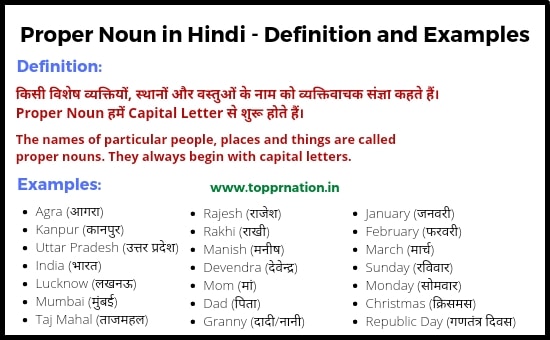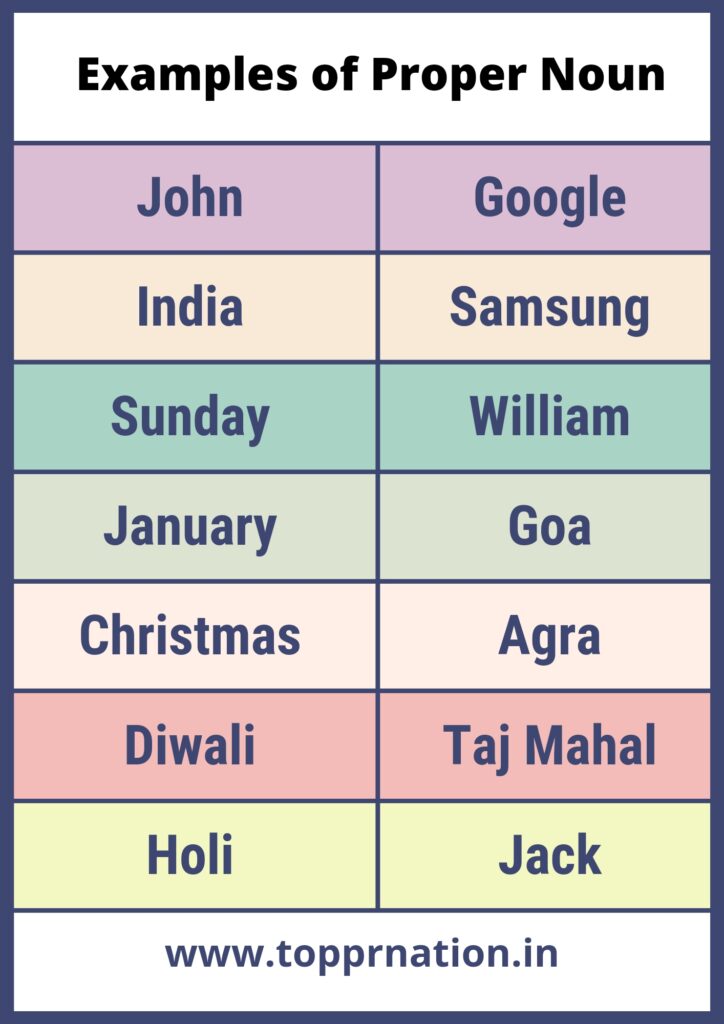Proper Noun in Hindi – Definition, Rules and Examples and Sentences. Proper Noun definition in Hindi and Rules. Examples of proper noun in Hindi. प्रॉपर नाउन – व्यक्तिवाचक संज्ञा की परिभाषा हिंदी व अंग्रेजी में। What is Proper Noun in Hindi?
Proper Noun को हिंदी में व्यक्तिवाचक संज्ञा कहते हैं। प्रॉपर नाउन भी संज्ञा का एक प्रमुख भाग है। संज्ञा का अर्थ ‘नाम’ होता है। नीचे दिए गए कुछ वाक्यों में प्रॉपर नाउन दिए गए हैं। इन्हें ध्यान से समझें
- कमल एक बहुत बड़ा व्यापारी है।
Kamal is a big businessman. - श्याम आपका पुराना मित्र है।
Shyam is your old friend. - ताजमहल आगरा में स्थित है।
Taj Mahal is located in Agra. - वह कानपुर में 2 साल से रह रहा है।
He has been living in Kanpur for 2 years. - वह इंडिया एयरलाइंस में काम करता है।
He works for India Airlines. - क्या तुम न्यूयॉर्क जाना चाहते हो?
Do you want to go to New York? - आपका बेटा रविवार को आएगा।
Your son will come on Sunday. - मैं आपसे जनवरी में मिलूंगा।
I will meet you in January. - क्या तुम क्रिसमस मना रहे हो?
Are you celebrating Christmas?
Note: ऊपर दिए गए वाक्यों में काले गहरे रंग में लिखे हुए शब्द proper nouns (व्यक्तिवाचक संज्ञा) के उदाहरण हैं। इन उदाहरणों में व्यक्तिवाचक संज्ञा के रूप में व्यक्तियों के नाम, जगहों के नाम, त्योहारों के नाम, तथा दिनों या महीनों के नाम हैं। इनका पहला अक्षर Capital Letter है।

इस पोस्ट में आप प्रॉपर नाउन की हिंदी में परिभाषा, उदाहरण तथा नियमों को सीखेंगे। पोस्ट में आगे व्यक्तिवाचक संज्ञा की परिभाषा हिंदी तथा अंग्रेजी में उदाहरण तथा नियम सहित दी गई है। प्रॉपर नाउन के बारे में हिंदी में पढ़ने से पहले आप Noun के बारे में अवश्य पढ़ें नीचे दी गई लिंक से Noun के बारे में पढ़ सकते हैं।
- Noun in Hindi
- Common Noun in Hindi
- Collective Noun in Hindi
- Material Noun in Hindi
- Abstract Noun in Hindi
Proper Noun in Hindi – Definition and Examples
Definition of Proper Noun in Hindi: किसी विशेष व्यक्तियों, स्थानों और वस्तुओं के नाम को व्यक्तिवाचक संज्ञा कहते हैं। Proper Nouns हमेशा Capital Letter से शुरू होते हैं।
Definition of Proper Noun in English: The names of particular people, places and things are called proper nouns. They always begin with capital letters.
Examples of Proper Nouns:
Names of Places (स्थानों के नाम) में किसी गांव, नगर, शहर, जिला, राज्य, देश, विद्यालय, बैंक, कम्पनी आदि के नाम Proper Nouns होते हैं।
- Agra (आगरा)
- Kanpur (कानपुर)
- Uttar Pradesh (उत्तर प्रदेश)
- India (भारत)
- Lucknow (लखनऊ)
- Mumbai (मुंबई)
- City Hospital (जिला अस्पताल)
- National Bank of India (नेशनल बैंक ऑफ इंडिया)
- State Bank of India (स्टेट बैंक ऑफ इंडिया)
- St. John’s College (सेंट जॉन्स कॉलेज)
Names of Persons (व्यक्तियों के नाम) Proper Nouns होते हैं।
- Rajesh (राजेश)
- Rakhi (राखी)
- Manish (मनीष)
- Devendra (देवेन्द्र)
- Mom (मां)
- Dad (पिता)
- Granny (दादी/नानी)
- Mr. Verma (मिस्टर बर्मा)
- Mrs. Kaushik (मिसेज कौशिक)
- Santa Claus (सैंटा क्लॉस)
- Mahatma Gandhi (महात्मा गांधी)
- Abraham Lincoln (अब्राहम लिंकन)
Names of Months (महीनों के नाम) Proper Nouns होते हैं।
- January (जनवरी)
- February (फरवरी)
- March (मार्च)
- April (अप्रैल)
- May (मई)
- June (जून)
- July (जुलाई)
- August (अगस्त)
- September (सितंबर)
- October (अक्टूबर)
- November (नवंबर)
- December (दिसंबर)
Names of Days (दिनों के नाम) Proper Noun होते हैं।
- Sunday (रविवार)
- Monday (सोमवार)
- Tuesday (मंगलवार)
- Wednesday (बुधवार)
- Thursday (गुरुवार)
- Friday (शुक्रवार)
- Saturday (शनिवार)
Names of Special Days (खास दिनों के नाम)
- Republic Day (गणतंत्र दिवस)
- Diwali (दिवाली)
- Holi (होली)
- Rakshabandhan (रक्षाबंधन)
- Ganesh Chaturthi (गणेश चतुर्थी)
- New Year’s Day (नई साल का दिन)
- Mother’s Day (मातृ दिवस)
- Father’s Day (पित्र दिवस)
- Independence Day (स्वतंत्रता दिवस)
- Valentine’s Day (वैलेंटाइंस डे)
- Halloween (हाॅलोवीन)
- Christmas (क्रिसमस)
- Eid (ईद)
Names of Buildings or Monuments (इमारतों या स्मारकों के नाम)
- the Taj Mahal
- the Red Fort
- the Hawamahal
- the Qutub Minar
- the Eiffel Tower
- the Great Wall of China
- the Leaning Tower of Pisa
- the Statue of Liberty
- the Statue of Unity
Name of Languages
- Hindi (हिंदी)
- English (अंग्रेजी)
- Urdu (उर्दू)
- French (फ्रेंच)
- Tamil (तमिल)
- Telugu (तेलुगू)
- Chinese (चीनी)
- Thai (थाई)
- Japanese (जापानी)
People of a particular country
- India – Indian (भारतीय)
- Japan – Japanese (जापानी)
- China – Chinese (चीनी)
- Korea – Korean (कोरियन)
- England – English (अंग्रेज)
- Australia – Australian (ऑस्ट्रेलियन)
- Africa – African (अफ्रीकन)
- France – French (फ्रेंच)
Note: ऊपर दिए गए proper nouns के examples से आप समझ सकते हैं कि इनका पहला अक्षर capital letter में लिखा जाता है। अतः आप ऊपर दिए गए सभी proper nouns का पहला अक्षर हमेशा capital में ही लिखें।
Proper Noun Meaning in Hindi
Proper Noun की Hindi Meaning व्यक्तिवाचक संज्ञा होती है। व्यक्तिवाचक संज्ञा से किसी विशेष व्यक्ति, वस्तु या स्थान के नाम का बोध होता है। नीचे दी गई हिंदी मीनिंग तथा उच्चारण को समझें।
Proper Noun Meaning in Hindi:
- व्यक्तिवाचक संज्ञा
- व्यक्तिवाचक नाम
Pronunciation of Proper Noun:
- ˈpropə naʊn’
- प्रॉपर नाउन
Read Also:
Use of Proper Nouns in Hindi
1. Proper Nouns का पहला अक्षर हमेशा कैपिटल होता है अर्थात जब भी आप प्रॉपर नाम को वाक्य के प्रारंभ में या बीच में या कहीं भी लिखते हैं तो उसका पहला अक्षर आपको कैपिटल (capital) ही बनाना चाहिए।
Examples:
1. I lived in Goa.
मैं गोवा में रहता था।
2. She was reading Mahatma Gandhi’s autobiography.
वह महात्मा गांधी की आत्मकथा पढ़ रही थी।
3. I met Mr. Narendra Modi last week.
मैं पिछले हफ्ते श्री नरेंद्र मोदी से मिला था।
4. She can’t go to Agra today.
वह आज आगरा नहीं जा सकती है।
5. They will buy a new car on Monday.
वे सोमवार को नई कार खरीदेंगे।
6. New Delhi is the capital of India.
नई दिल्ली भारत की राजधानी है।
2. Proper Nouns का प्रयोग वाक्य के कर्ता ( Subject) के रूप में भी होता है।
Examples:
1. William Shakespeare was a great writer.
विलियम शेक्सपियर एक महान लेखक थे।
2. Mumbai is the famous city of Maharashtra.
मुंबई महाराष्ट्र का प्रसिद्ध शहर है।
3. Diwali is the festival of lights.
दिवाली रोशनी का त्योहार है।
4. An Indian always fights for his country.
एक भारतीय हमेशा अपने देश के लिए लड़ता है।
5. The Taj Mahal is situated in Agra.
ताजमहल आगरा में स्थित है।
Read Also:
Examples of Proper Nouns in Hindi
1. Ram is a brave boy.
राम एक बहादुर लड़का है।
2. Sohan lives in his village.
सोहन अपने गांव में रहता है।
3. Abraham Lincoln was the President of America.
अब्राहम लिंकन अमेरिका के राष्ट्रपति थे।
4. He works in Flipkart.
वह फ्लिपकार्ट में काम करता है।
5. I live in India.
मैं भारत में रहता हूं।
6. वह 4 साल से तमिलनाडु में रह रहा है।
He has been living in Tamil Nadu for 4 years.
7. क्या आपने कभी स्टैच्यू ऑफ यूनिटी देखी है?
Have you ever seen the Statue of Unity?
8. Have you deposited money in State Bank of India?
क्या तुमने स्टेट बैंक ऑफ इंडिया में पैसा जमा किया है?
9. He bought a new Samsung smartphone last year.
उसने पिछले साल सैमसंग का नया स्मार्टफोन खरीदा।
10. When did you learn the English language?
तुमने अंग्रेजी भाषा कब सीखी?
11. I want to meet you at Christmas.
मैं आपको क्रिसमस पर मिलना चाहता हूं।
12. Sohan does not go to his office on Sunday.
सोहन रविवार को अपने कार्यालय नहीं जाता है।
13. Do you read the poems of William Wordsworth?
क्या तुम विलियम वर्ड्सवर्थ की कविताएं पढ़ते हो?
14. You want to move to America.
तुम अमेरिका में जाना चाहते हो।
16. He wants to buy a house in Uttar Pradesh.
वह उत्तर प्रदेश में एक मकान खरीदना चाहता है।
17. Mr. Verma wants to party with his friends.
मिस्टर वर्मा अपने दोस्तों के साथ पार्टी करना चाहते हैं।
18. Raj came two days back to celebrate Republic Day.
राज दो दिन पहले गणतंत्र दिवस मनाने आया।
19. He will come on Independence Day in August.
वह अगस्त में स्वतंत्रता दिवस पर आएगा।
20. Do you study in Delhi Public School?
क्या तुम दिल्ली पब्लिक स्कूल में पढ़ते हो?
Read Also:
Proper Noun Rules in Hindi
Proper Noun का वाक्यों में प्रयोग करते समय आपको नीचे दिए गए नियमों को ध्यान रखना चाहिए;
Rule – 1 Proper Nouns से पहले a/an तथा the का प्रयोग नहीं करते हैं।
- She goes to the Meerut in July. (❌)
- She goes to Meerut in July. (✔️)
- An Agra is a good city. (❌)
- Agra is a good city. (✔️)
- The Jack wants to meet a John. (❌)
- Jack wants to meet John. (✔️)
Rule – 2 Proper Noun का First Letter हमेशा Capital Letter से लिखना है।
- Jack couldn’t find his purse. (जैक को उसका पर्स नहीं मिला।)
- I want to visit the Statue of Liberty. (मैं स्टैच्यू ऑफ लिबर्टी देखना चाहता हूं।)
- They have never visited Bangladesh. (वे कभी बांग्लादेश नहीं गए।)
- Don’t go on Saturday. (शनिवार को मत जाओ।)
- Mr. James played well yesterday. (मिस्टर जेम्स ने कल अच्छा खेला।)
Read also:
Frequently Asked Questions on Proper Noun in Hindi
1. What is Proper Noun in Hindi?
वे शब्द जो किसी विशेष व्यक्ति स्थान या वस्तु का बोध कराते हैं, उन्हें proper noun कहते हैं। जैसे; Ram, Agra, Pen, Book, Chair, Truth etc.
2. प्रॉपर नाउन कौन-कौन से होते हैं?
व्यक्तियों के विशेष नाम, वस्तुओं के विशेष नाम, तथा स्थानों के विशेष नाम प्रॉपर नाउन होते हैं। जैसे; Shyam, Agra, Taj Mahal, Ramayana, Ganga आदि प्रॉपर नाउन के उदाहरण हैं।

Conclusion
In this post, you have read about the proper noun in Hindi with its definition rules and examples. Proper nouns are the names of a particular person place of thing. If you are learning English grammar it is mandatory to learn parts of speech properly so that you can identify every word. It will help you in the competitive exams. You can solve any English grammar question if you study the rules of parts of speech very well.
- Easy Hindi to English Translation - March 20, 2024
- Present Tense in Hindi – परिभाषा, प्रकार तथा उदाहरण - March 17, 2024
- Personal Pronoun in Hindi – Definition, Examples and Rules - March 8, 2024

